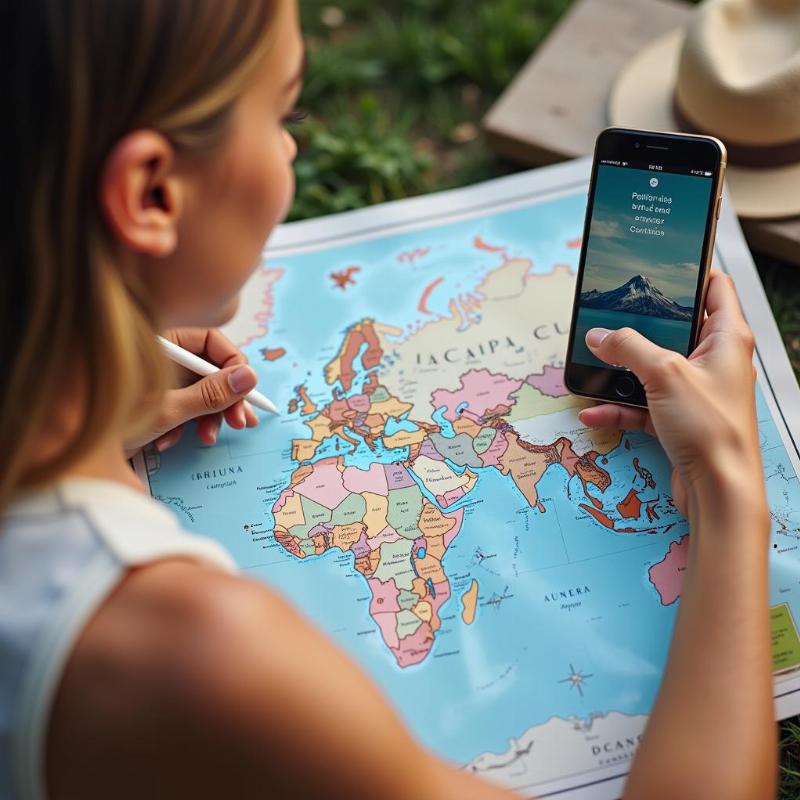The term “place of occurrence” is crucial in many aspects of travel, especially when dealing with unforeseen circumstances or planning specific activities. Whether it’s for insurance claims, reporting lost items, or simply pinpointing the exact location of a memorable experience, knowing the place of occurrence is essential. This guide will delve into the importance of understanding and accurately recording this information, providing valuable tips and insights for both domestic and international travelers.
Why is Knowing the Place of Occurrence Important?
When traveling, unexpected situations can arise, from minor inconveniences like lost luggage to more serious incidents like accidents or illnesses. In such cases, knowing the precise place of occurrence can be crucial. For insurance claims related to lost luggage, theft, or medical emergencies, providing the exact location where the incident occurred is often mandatory. Think of it as the cornerstone of your claim, enabling efficient processing and ensuring you receive the appropriate assistance. Imagine losing your passport in a bustling market; knowing the specific stall or area can significantly aid in its recovery.
Furthermore, accurately documenting the place of occurrence is vital for legal or administrative purposes. If you’re involved in an accident, reporting the exact location to the authorities is essential for investigation and documentation. Similarly, if you need to contact your embassy for assistance, providing the precise location of your current situation can expedite their response.
How to Accurately Record the Place of Occurrence
Recording the place of occurrence might seem straightforward, but it’s important to be thorough and specific. Don’t just note the city; try to be as detailed as possible. For example, instead of just “Delhi,” write down “Connaught Place, New Delhi, near the Rajiv Chowk metro station.” This level of detail can be incredibly helpful.
Here are some practical tips for accurately recording the place of occurrence:
- Utilize GPS: Use your smartphone or GPS device to pinpoint your exact coordinates.
- Take Note of Landmarks: Identify nearby landmarks, businesses, or street names.
- Keep Records: Maintain a travel journal or use a note-taking app on your phone.
- Photograph or Video: Capture images or videos of the location, especially if it’s relevant to an incident.
Place of Occurrence in Travel Planning
Beyond its importance in unforeseen circumstances, the concept of “place of occurrence” also applies to planning specific activities. When researching destinations, knowing the exact location of attractions, restaurants, or events helps optimize your itinerary and ensures a smoother travel experience. For instance, knowing the precise location of a haunted places in nainital allows you to plan your transportation and allocate sufficient time for the visit.
 Traveler Planning Itinerary with Map
Traveler Planning Itinerary with Map
What if I Don’t Know the Exact Place of Occurrence?
Sometimes, determining the exact place of occurrence can be challenging, especially in unfamiliar surroundings. In such cases, do your best to provide as much information as possible. Describe the area, mention any distinctive features you recall, and seek assistance from locals or authorities. Even approximate information can be valuable in certain situations.
Conclusion
Understanding and accurately recording the place of occurrence is a vital aspect of travel, both for handling unforeseen circumstances and for efficient planning. By following the tips outlined in this guide, you can ensure a smoother, safer, and more enjoyable travel experience. Being prepared and informed empowers you to navigate any situation effectively, making your journey more fulfilling and stress-free. So, the next time you travel, remember the significance of “place of occurrence” and take the necessary steps to document it accurately.
FAQ
- Why is the “place of occurrence” important for insurance claims? Because it validates the claim and helps determine the appropriate course of action.
- What should I do if I lose my passport and don’t know the exact place of occurrence? Try to provide as much information as you can remember about the area and seek assistance from local authorities.
- How can GPS help me record the place of occurrence? It provides precise coordinates, making it easier to pinpoint the exact location.
- Is it necessary to record the place of occurrence even for minor incidents? It’s always a good practice, as even seemingly minor incidents can escalate and require documentation.
- Can photos and videos be used as proof of the place of occurrence? Yes, they can serve as valuable visual evidence, especially in case of accidents or disputes.
- What details should I include when recording the place of occurrence? Include as much information as possible: address, landmarks, nearby businesses, GPS coordinates, etc.
- How can knowing the place of occurrence help with travel planning? It allows for efficient itinerary planning, ensuring you know the exact location of attractions and activities.
PlaTovi is your one-stop solution for all your travel needs. We offer a comprehensive range of services, including traditional tour packages, hotel and resort bookings, international and domestic flight tickets, event and wedding planning, car rentals, and visa assistance. Whether you’re planning a trip to haunted places in london or exploring srisailam nearby places to visit, we can help you create an unforgettable travel experience. For inquiries, contact us at [email protected] or call us at +91 22-2517-3581. Let PlaTovi help you plan your next adventure!